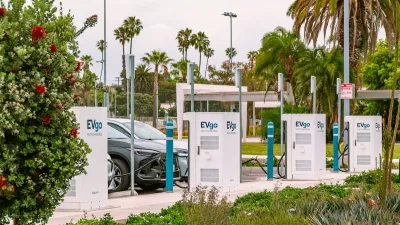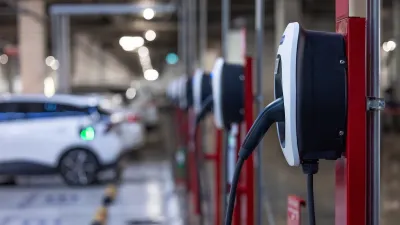Kirk Kardashian examines the headwinds confronting the much-hyped, but poorly selling, E.V. industry in the aftermath of a disappointing year. Meanwhile California, New York and six other states have announced plans to help energize sales.
Despite substantial government and private sector investment, the 45,000 in annual electric car sales in the U.S. lags far below the Obama administration's goal of one million vehicles sold by 2015. Kardashian identifies the underlying problem with electric vehicles: "the cost and ineffectiveness of their batteries."
"Meanwhile, gasoline-powered cars are becoming more efficient all the time," he adds." That’s good for the environment and consumers, but probably frustrating for E.V. engineers, as their central competition—internal-combustion engines—is better funded, improving quickly, and supported by a hundred and sixty-eight thousand quick-charge spots known as gas stations."
Last week, a group of eight states announced a partnership to help improve E.V. infrastructure and boost sales. According to Matthew L. Wald, "The states, which represent more than a quarter of the national car market, said they would seek to develop charging stations that all took the same form of payment, simplify rules for installing chargers and set building codes and other regulations to require the stations at workplaces, multifamily residences and at other places," with the goal of selling 3.3 million zero-emission vehicles by 2025.
FULL STORY: WHY ELECTRIC VEHICLES HAVE STALLED

Alabama: Trump Terminates Settlements for Black Communities Harmed By Raw Sewage
Trump deemed the landmark civil rights agreement “illegal DEI and environmental justice policy.”

Planetizen Federal Action Tracker
A weekly monitor of how Trump’s orders and actions are impacting planners and planning in America.

The 120 Year Old Tiny Home Villages That Sheltered San Francisco’s Earthquake Refugees
More than a century ago, San Francisco mobilized to house thousands of residents displaced by the 1906 earthquake. Could their strategy offer a model for the present?

In Both Crashes and Crime, Public Transportation is Far Safer than Driving
Contrary to popular assumptions, public transportation has far lower crash and crime rates than automobile travel. For safer communities, improve and encourage transit travel.

Report: Zoning Reforms Should Complement Nashville’s Ambitious Transit Plan
Without reform, restrictive zoning codes will limit the impact of the city’s planned transit expansion and could exclude some of the residents who depend on transit the most.

Judge Orders Release of Frozen IRA, IIJA Funding
The decision is a victory for environmental groups who charged that freezing funds for critical infrastructure and disaster response programs caused “real and irreparable harm” to communities.
Urban Design for Planners 1: Software Tools
This six-course series explores essential urban design concepts using open source software and equips planners with the tools they need to participate fully in the urban design process.
Planning for Universal Design
Learn the tools for implementing Universal Design in planning regulations.
Clanton & Associates, Inc.
Jessamine County Fiscal Court
Institute for Housing and Urban Development Studies (IHS)
City of Grandview
Harvard GSD Executive Education
Toledo-Lucas County Plan Commissions
Salt Lake City
NYU Wagner Graduate School of Public Service





























